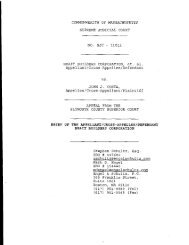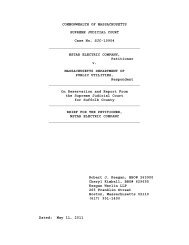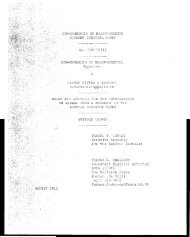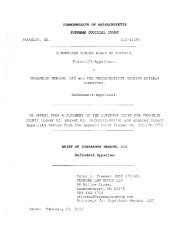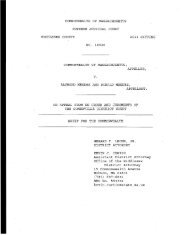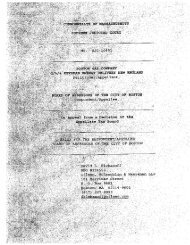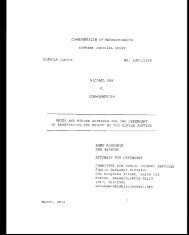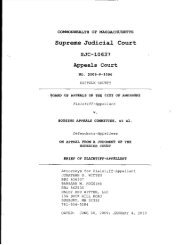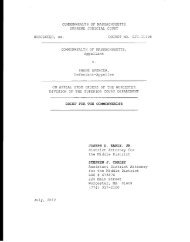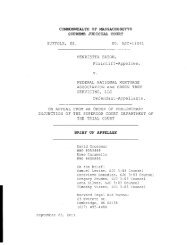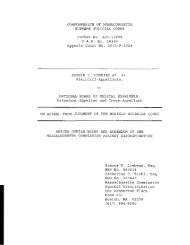for Suffolk County - Mass Cases
for Suffolk County - Mass Cases
for Suffolk County - Mass Cases
Create successful ePaper yourself
Turn your PDF publications into a flip-book with our unique Google optimized e-Paper software.
Moreover, the MCAD wrote in its amicus brief in the<br />
case of St. Fleur v. WPI Cable Systems 450 <strong>Mass</strong>. 245<br />
(20081, that a coerced arbitration agreement signed as a<br />
condition of employment may constitute of per se violation<br />
of G.I.. c. 151B, 5 4 (4A). Addendum -. F, at 22-23. With<br />
section 4(4A) in mind, the MCAD also wrote,<br />
The Commission views compulsory pre-dispute<br />
arbitration agreements presented as a condition of<br />
employment as violating the public's interest in fair,<br />
open and public proceedings envisioned by the<br />
Legislature through G.L. c. 151B. . . . Moreover,<br />
arbitration agreements where the employer exacts a<br />
waiver by coercion, threats, or intimidation, of any<br />
right granted or protected by Chapter 1518, may<br />
constitute a per se violation of G.L. c. 151B. . . .<br />
The Commission believes that such agreements violate<br />
the Camonwealth's anti-discrimination statute and are<br />
there<strong>for</strong>e unen<strong>for</strong>ceable.<br />
Addendum F, at 8 (emphasis added). The MCAD is accorded<br />
deference in its reasonable interpretation of C. 1518.<br />
-. Cuddyer v. Stop & Shop Supermarket Co-.", 434 <strong>Mass</strong>. 521, 534,<br />
536 (2001) ("We have consistently granted deference to MCAD<br />
decisions and policies").<br />
invalidate the agreement based on Joule's coercive conduct<br />
in inducing the "agreement. 'a<br />
-I<br />
MEIA urges this Court to<br />
' A recent decision of the United States Supreme Court,<br />
Rent-a-Center, West, Inc. v. Jackson -1 2010 U.S. Lexis 4891<br />
(June 21, 2010), heid that employers can impose agreements<br />
that require arbitrators, and not courts, to rule on the<br />
en<strong>for</strong>ceability of arbitration agreements. Arbitrators, <strong>for</strong><br />
many reasons, are institutionally inclined to favor the<br />
en<strong>for</strong>cement arbitration agreements. Once an arbitrator has<br />
found an agreement en<strong>for</strong>ceable, a litigant is unlikely to<br />
obtain de novo court review, as arbitration decisions are<br />
upheld, even if they are based on an error of law. Advest,<br />
31



